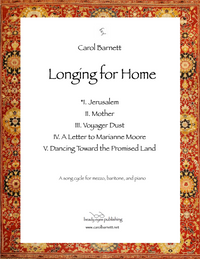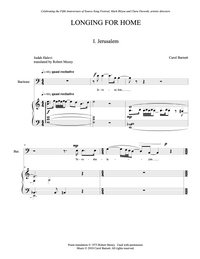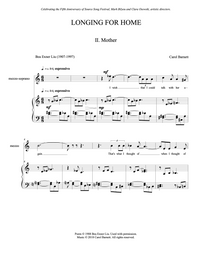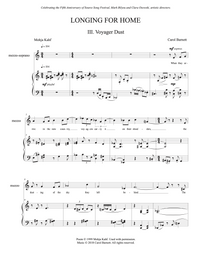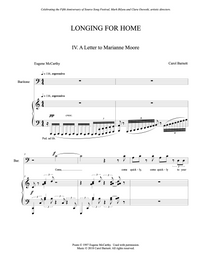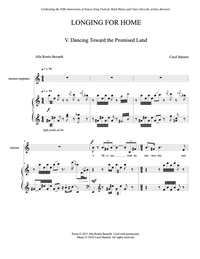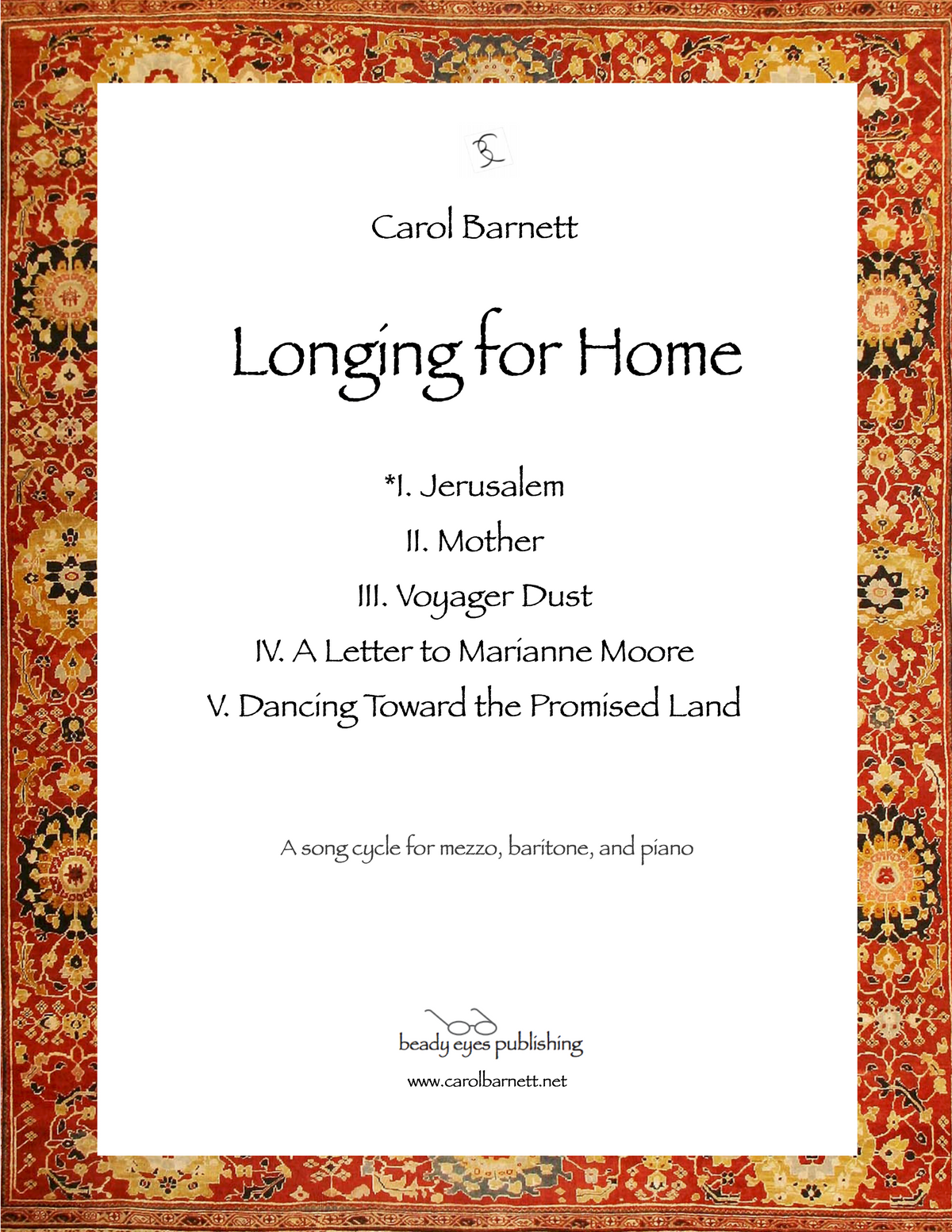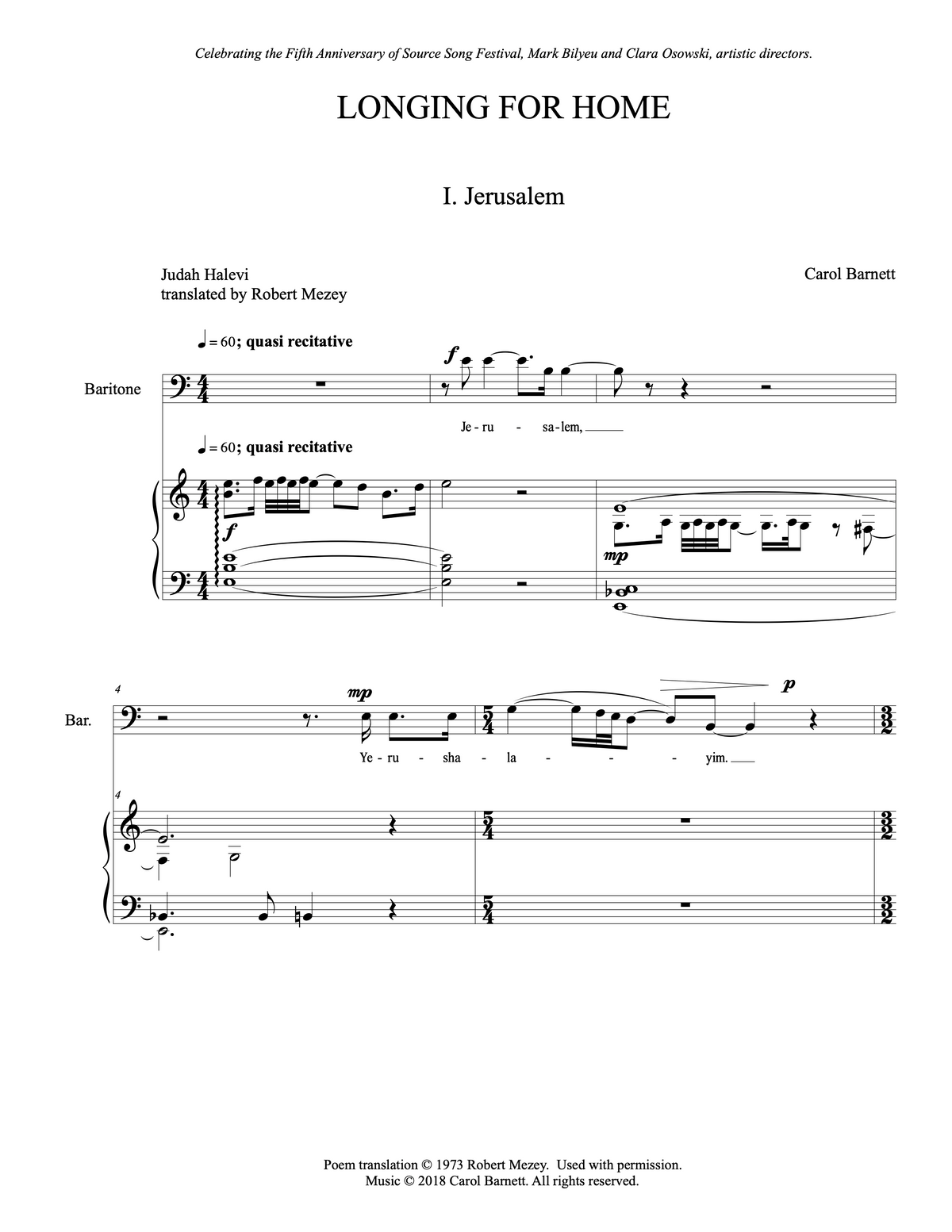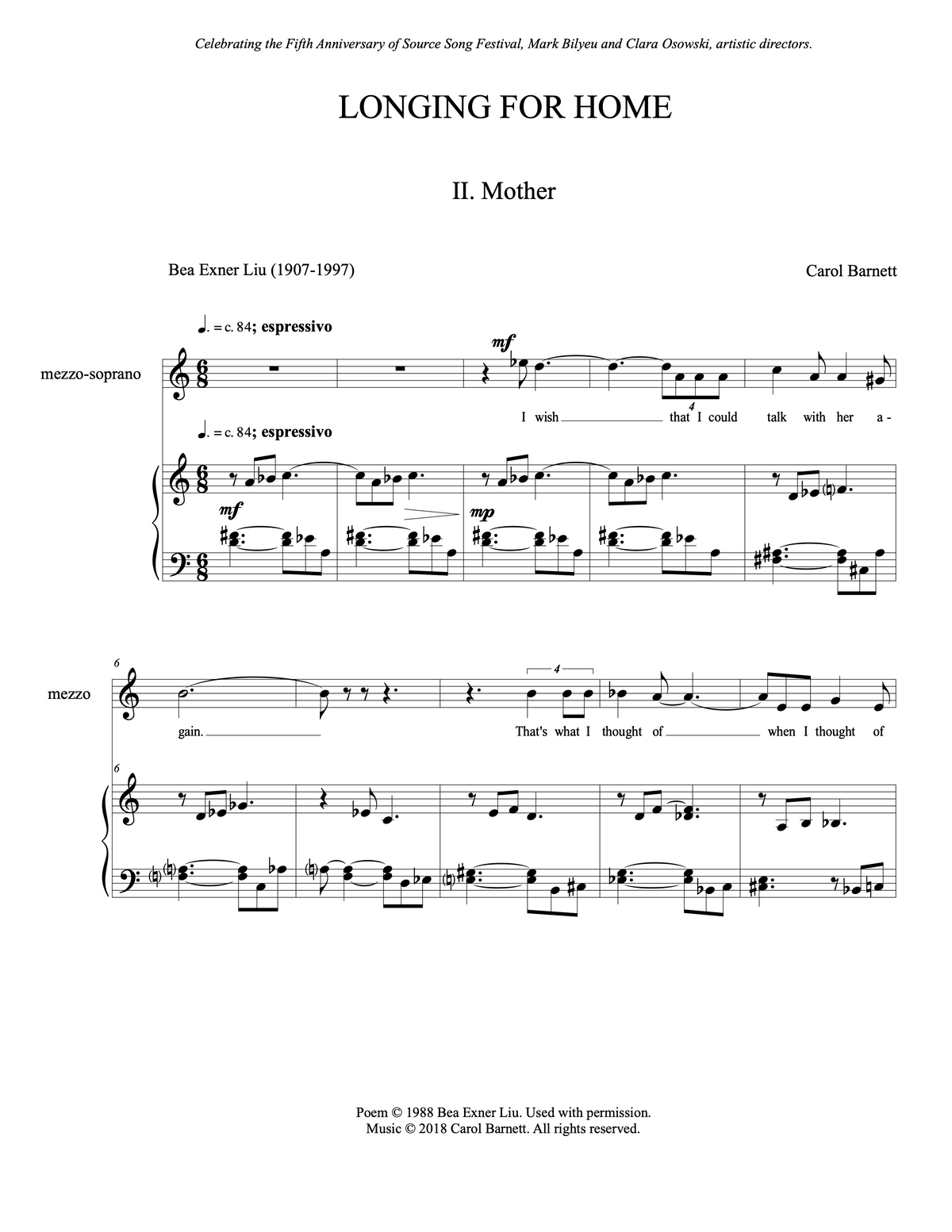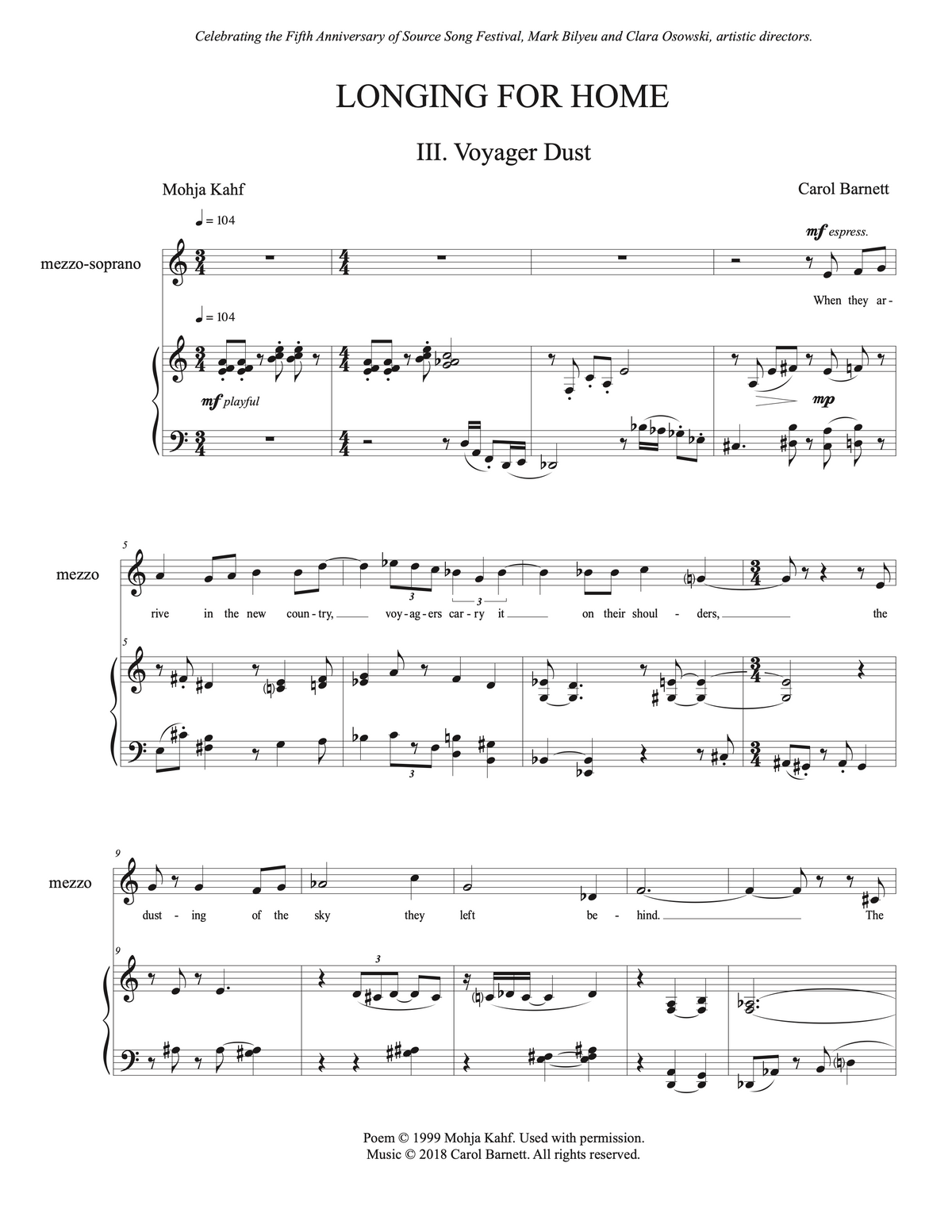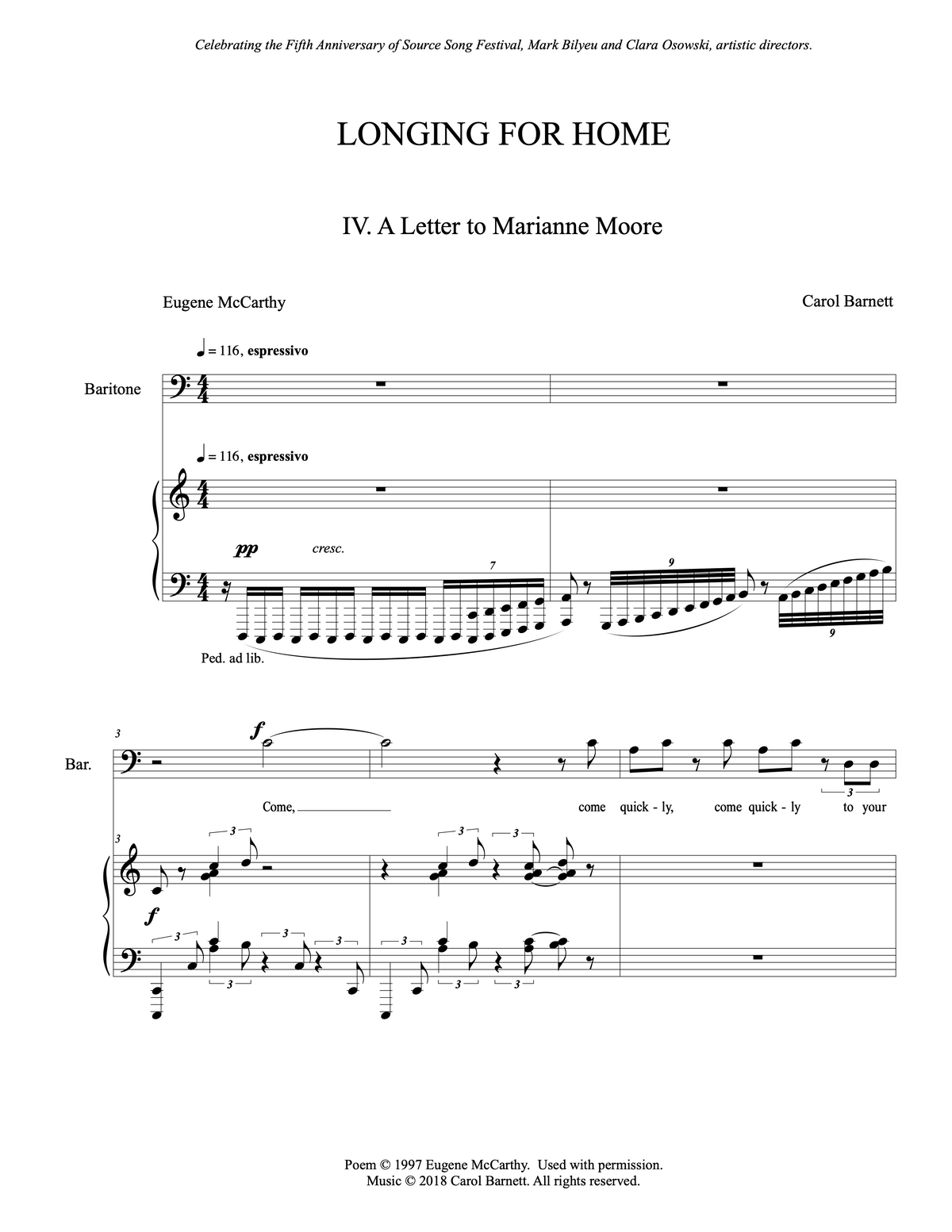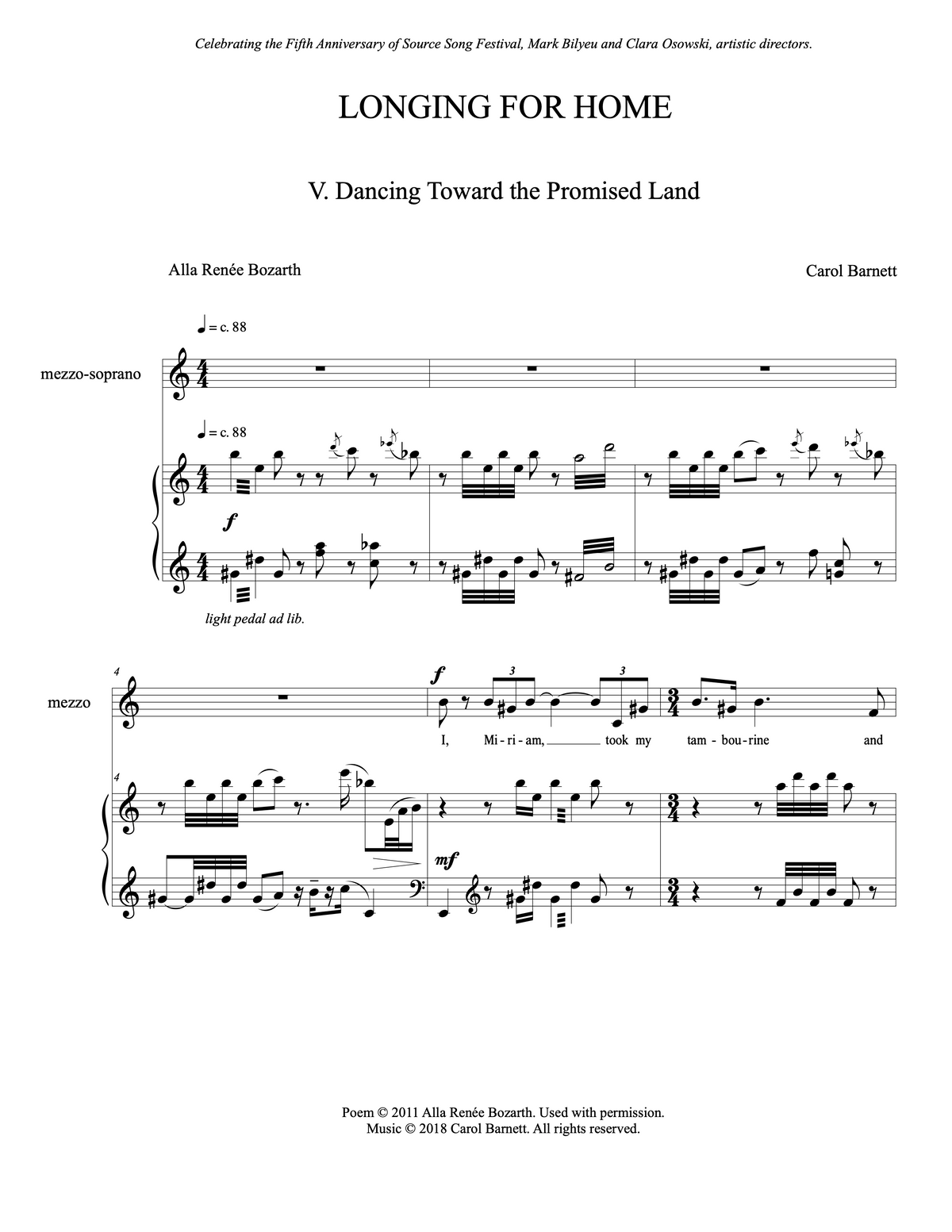Longing for Home – Carol Barnett
- Regular
- $19.99
- Sale
- $19.99
- Regular
- Unit Price
- per
Composer: Carol Barnett
Text by: Robert Mezey (b. 1935), Bea Exner Liu (1907-1997), Mohja Kahf (b. 1967), Eugene McCarthy (1916-2005), Alla Renée Bozarth
Instrumentation: mezzo soprano, baritone, piano
Duration: approx. 20 minutes
Jerusalem [c 3:30]
Mother [c 4:15]
Voyager Dust [c 4:00]
A Letter to Marianne Moore [c 4:00]
Dancing Toward the Promised Land [c 3:30]
Date Written: 2018
Composer’s note: Longing for Home is a song cycle written to celebrate Source Song Festival’s fifth season. The texts all reference homecoming in various ways – the enduring wish to return to a place remembered with love and longing, as well as the uncertainty, the impossibility of doing so.
“Jerusalem” – a cry of anguish echoes from the 11th century for a once-magnificent city, now in ruins, reduced to rubble. The musical influences of Jerusalem include Jewish liturgical cantillation, middle-eastern scales with their frequent augmented seconds, and word-painting – the soaring of an eagle, the excruciating sting of a scorpion. Physician, poet and philosopher Judah Halevi was born in 11th-century Spain, and died in 1141 shortly after arriving in the Holy Land. He is considered one of the greatest Hebrew poets, celebrated both for his religious and his secular works, many of which appear in present-day Jewish liturgy. Translator Robert Mezey is a contemporary American poet and academic.
“Mother” –The music mirrors the unsettled sadness of a daughter’s too-long-delayed visit home, now bereft of its center of gravity. Memories of beloved rituals, of a sympathetic ear, are brought to life once more by the nearness of familiar objects, and finally, the almost tangible sound of her mother’s voice: “You’re a big girl now. You can work it out.” Bea Exner Liu was born and raised in Northfield, Minnesota, and graduated from Carleton College. She moved to China in 1935 to teach English, and while there, married a Chinese classmate from Carleton and witnessed the Japanese invasion of China during the years 1935 to 1945.
“Voyager dust” is the essence of the home we carry with us, instantly recognizable by other voyagers. What a wonderful opportunity to write a musical evocation of places as far away as Beijing, Guangzhou, Damascus, Aleppo, and the challenge of creating the scene of lighthearted children’s play – running underneath a canopy of wet scarves, feeling the spray of water as they are shaken out – and then to contrast that with the somber realization that the poet is in exile, unlikely to return home anytime soon. Mohja Kahf is a Syrian-American poet, novelist, and professor.
“A Letter to Marianne Moore - Eugene McCarthy’s fanciful invitation to Marianne Moore, who died in 1972, references several familiar landmarks of the city of which she was a long-time resident. The boats, the piers, the ferry, the bridges, the gargoyles and the lions at the New York Public Library all afford opportunities for sonic pictures – horns, still waters or ripples, and those library lions processing down the street. Eugene McCarthy (1916-2005) was an American politician, poet, and long-time Congressman from Minnesota.
“Dancing Toward the Promised Land” – Ranging freely across the centuries, Miriam, sister of Moses, remembers her younger self leading the way out of Egypt with her dances and songs, and imagining what it will be like to enter the Promised Land. But Miriam never did reach the Promised Land, and the poet is writing many centuries later. How powerfully historical events still influence us, and how strong is the urge to return to the promised land of home. Poet, prose writer and spiritual director Alla Reneé Bozarth was among the first eleven women ordained as Episcopal priests in 1974 in Philadelphia.
text
JERUSALEM (after Halevi)
Beautiful heights, city of a great King,
From the western coast my desire burns towards thee.
Pity and tenderness burst in me, remembering
Thy former glories, thy temple now broken stones.
I wish I could fly to thee on the wings of an eagle
And mingle my tears with thy dust.
I have sought thee, love, though the King is not there
And instead of Gilead’s balm, snakes and scorpions.
Let me fall on thy broken stones and tenderly kiss them—
The taste of thy dust will be sweeter than honey to me.
Robert Mezey (b. 1935)
MOTHER
I wish that I could talk with her again.
That’s what I thought of when I thought of home,
Always supposing I had a home to come to.
If she were here, we’d warm the Chinese pot
To brew a jasmine-scented elixir,
And I would tell her how my life has been—
All the parts that don’t make sense to me,
And she would let me talk until the parts
Fitted together.
That will never be.
She couldn’t wait for me to come to her—
Ten years away. I couldn’t wish for her
To wait, all blind and helpless as she was.
So now I have come home to emptiness:
No silly welcome-rhyme, no happy tears,
No eager questioning. No way to get
An answer to my questions. Silence fills
The rooms that once were vibrant with her song,
And all the things I wanted to talk out
With her are locked forever in my heart.
I wander through the rooms where she is not.
Alone I sit on the hassock by her chair,
And there, at last, I seem to hear her voice:
“You’re a big girl now. You can work things out.”
Bea Exner Liu (1907-1997)
VOYAGER DUST
When they arrive in the new country,
voyagers carry it on their shoulders,
the dusting of the sky they left behind.
The woman on the bus in the downy sweater,
I could smell it in her clothes.
It was voyager’s dust from China.
It lay in the foreign stitching of her placket.
It said: We will meet again in Beijing,
in Guangzhou. We will meet again.
My mother had voyager’s dust in her scarves.
I imagine her a new student like this woman on the bus,
getting home, shaking out the clothes from her suitcase,
hanging up, one by one, the garments from the old country.
On washing day my mother would unroll her scarves.
She’d hold one end, my brother or I the other,
and we’d stretch the wet georgette and shake it out.
We’d dash, my brother or I, under the canopy,
its soft spray on our faces like the ash
of debris after the destruction of a city,
its citizen driven out across the earth.
We never knew
it was voyager dust. It said:
We will meet again in Damascus,
in Aleppo. We will meet again.
It was Syria in her scarves.
We never knew it.
Now it is on our shoulders too.
Mohja Kahf (b. 1967)
LETTER TO MARIANNE MOORE
(in tribute to Joseph Grucci)
Come quickly to your city.
All the boats at the piers
are quiet, waiting for you.
Only their flags and pennants move
and those gently as tongues whispering
you down from the sky.
The horns and whistles all are silent,
so that you can hear our softer call.
The Staten Island Ferry leaves no wake.
All the waters are still
mirrors waiting for your face.
If another looks, they erase
with quick ripples and regret.
The bridges are bowed,
waiting, and the tunnels call.
The gargoyles hold their stern faces,
but like children waiting to open
presents, threaten to smile.
The lions at the library, one can see
in peripheral vision, twitch their tails,
eager to follow you down the street.
We have promised them your coming
to quiet them.
Everyone knows that there are brown butter-
flies in your hair, and agates
and small mirrors in your purse
and words.
Come quickly to your city.
Eugene McCarthy (1916-2005)
DANCING TOWARD THE PROMISED LAND
I, Miriam, took my tambourine
and finger cymbals with me
out of the land of slavery
with its daily insults and petty
exemptions, and so remain always
ready to dance on the long, long journey,
dance at every victory, beginning with
surviving the Passover, then the strange
occurrence when the Red Sea dried beneath
our feet as we ran, safely passing over the narrow
strip onto the Sinai Peninsula, all the way out
from the land of longing toward the storied memory of Home.
I danced to the song that spilled out of me,
loud up to Heaven, rejoicing on hopeful feet,
rejoicing with arms flying through warm air like wings.
God knows it may take a long time to return.
It’s been five hundred years, after all.
A long time gone, but our stories keep it alive
in our hearts. I wonder if I’ll live to see it from
the mountains across River Jordan. I wonder
if I’ll be an old woman, and dance down
the side of Mt. Nebo with arms wide open,
heart fluttering strong, leading the way
with cymbals and songs into the Promised Land.
This poem is in the unpublished book, My Blessed Misfortunes, by Alla Renée Bozarth,
Copyright 2011. All rights reserved.

